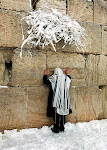22 Elul 5768
The ר"ן asks a very simple question: Why is ראש השנה the יום הדין? He comes up with two different answers:
1) Chazal tell us that Adam HaRishon was judged for eating from the עץ הדעת on the first day of the seventh month, which is Tishrei. Since that day was used as a יום הדין that very first time, it was established for generations as the day Hashem would judge us.
2) When בנ"י sinned with the Golden Calf, משה רבינו went up to Har Sinai to daven for us. Those 40 days of tefillah spanned all of Chodesh Elul and the first ten days of Tishrei, culminating on Yom Kippur. That forgiveness was sealed on Yom Kippur, but Hashem began forgiving us on Rosh HaShana.
This is the basis for the two minhagim of when to start Selichos. The Sefardim start from Rosh Chodesh Elul - after all, that was the first day Moshe davened on Har Sinai, that was the first day of the teshuva process. Ashkenazim start Selichos a week or so before Rosh HaShana, aligning themselves with the few days before Adam's sin, when the world existed without sin.
Whatever your minhag, Selichos can be tough. You have to stay up until 12:30 at night, or get up a half hour before davening to say a lot of Hebrew words you don't understand. What is the point? Wouldn't it just be better to take five minutes in the middle of the day and say some prayers in English?
While there may be many answers to this, I think that one of them is the following: Selichos shows Hashem that we're willing to go the extra mile to secure our forgiveness. We're putting in that little extra effort that says, Hashem, look! I'm trying! I know I had my ups and downs last year, but I really want to stay up! I really want this relationship between you and me to work out, and I'm doing something unusual to prove it to you!
להבדיל, it's like the husband who goes out of his way to get flowers for his wife after a long fight. Sure, these flowers are being sold out on Long Island somewhere, and they cost a little extra, and they're a little more bulky to shlep into the car - but the wife looks at all the extra effort and says, hey, you really do care! She doesn't care that there are twenty-four roses or thirty-six roses. It's the effort she looks at. So too for us - it's not so much about the Selichos as it is about showing Hashem you'll do anything to prove your dedication.
Now, don't get me wrong, the Selichos are important - it doesn't work just to stay up until 12:30am and do nothing. The Selichos are a valuable way to prepare for the יום הדין. But if you're getting depressed or upset that you're not getting the whole meaning from the Selichos, take solace - your effort in saying them is getting you much more than you realize.
הצלחה רבה!
Subscribe to:
Post Comments (Atom)

No comments:
Post a Comment